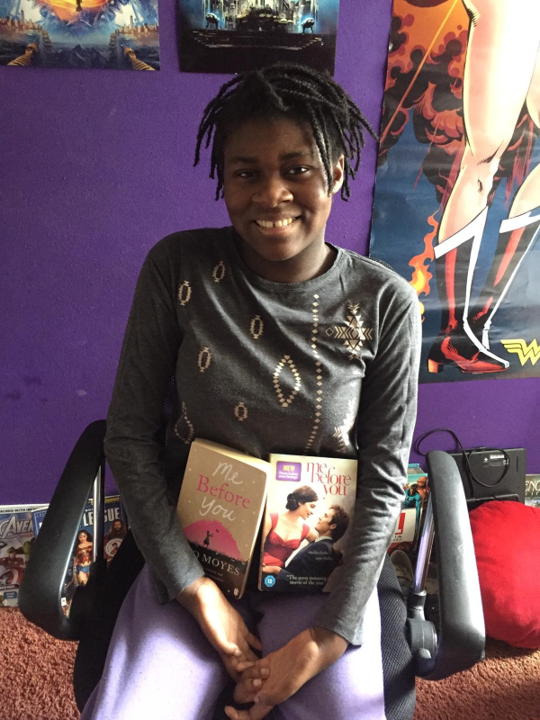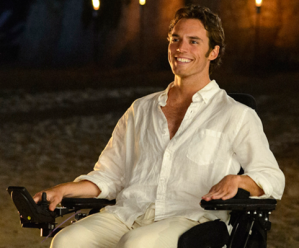Welcome to my first disabled representation review! Thank you guys so much for your suggestions. I decided to start with a fairly famous book: Me Before You by Jojo Moyes. Last month, I watched the film and read the book for the first time for review. I must warn you that this review is going to contain spoilers and will be discussing the topic of assisted suicide.

Synopsis
Young and quirky Louisa “Lou” Clark moves from one job to the next to help her family make ends meet. Her cheerful attitude is put to the test when she becomes a caregiver for Will Traynor, a wealthy young banker left paralyzed from an accident two years earlier. Will’s cynical outlook starts to change when Louisa shows him that life is worth living. As their bond deepens, their lives and hearts change in ways neither one could have imagined.
My Review

I’d like to start this review by saying that the topic of assisted suicide is a controversial one – and I would never disregard a book simply for discussing tough topics. However, I think that the handling of this topic was done extremely poorly in Me Before You and I’ll explain why throughout this review. The disabled representation in this was also quite upsetting because it ended with the disabled character ending his own life. While popular disabled representation is so rare and something that the world needs more of, are we sure that this is the type of representation that the world needs right now?
It’s clear that the topic of assisted suicide is important to the author, but I think that the world needed to be exposed to much more positive disabled representation before it was exposed to something like this. The world did not need another book where the disabled character kills themselves – it needs more representation showing people that life with a disability doesn’t always need to be unliveable. The world wasn’t in the right state yet to start thinking about this controversial topic, especially not in the way that Moyes represented it, and I think that she should’ve realised that.
Without further ado, here are my seven thoughts on Me Before You:
1. The Characters

The story centres around Will (a young, rich man who became a quadriplegic after a motorcycle accident) and his carer Louisa (from whose perspective the story is told). I enjoyed Louisa’s character. I loved how quirky she was and I think that Emilia Clarke played her really well in the film.

Will, on the other hand, was extremely mean and moody at the beginning of the novel but turned out to be affectionate to Lou towards the end. I often see defiant disabled characters like Will because it’s a way for them to rebel against the ‘eternally innocent/inspirational’ stereotype most disabled people get labelled with. However, much like the ‘tough, cool, and mysterious martial arts woman’ which was also created to combat stereotypes – it has itself become a stereotype. I still love seeing tough disabled characters, and I understand that Will acts out because he’s going through a lot, but he was mean to the point where I ended up not caring for his character much.

Regarding the casting of the characters for the film, I was shocked to see that the actor who played Will was not disabled, and the actor that played Lou was not plus-sized even though she was in the book. I can’t help wondering what would have been more difficult for Hollywood: to make the leading lady in the film plus-sized? Or to make Will’s character be played by someone who is actually disabled?
.
2. The Plot and Structure
The plot wasn’t that bad. It was interesting enough to keep me reading, it was realistic, and I liked the character interactions. The only thing that I didn’t like about the structure was how some short, random chapters switched perspective to the secondary characters without much purpose. It didn’t add anything to the story for me.
3. The Pay-off that Never Came

Throughout the entire book, I cringed at conversations where characters kept repeating how horrible being in a wheelchair is. Characters call Will a cripple and severely disregard and disrespect him. I kept waiting for the pay-off when a character would say: “You know what, we were wrong about Will’s disability!” or “So, being disabled isn’t as bad as we thought.” But it never came. There was no comeuppance for the characters who were previously horrible regarding Will’s disability.
At one point, Lou’s boyfriend, Patrick, said that he expected Lou to leave him if he ended up like Will and that he would kill himself if he did. This is never returned to, and in the end, Will does kill himself. And he refuses Lou’s love because he thinks that he would hold her back if they got together. In a way, he was proving Patrick right.
4. The Positive Impact
The good side of Me Before You is that I learned a lot of interesting facts about quadriplegics that I had never known before. My disability is so far from his that I couldn’t relate to anything except for the electric wheelchair struggles (I’ve also spent a fair amount of time trapped in mud). I think that, if the book had continued being like what it was in the beginning about a carer discovering new things about disabilities and slowly growing to like their patient, it could have been a great book.
5. The Negative Impact

I was upset when I watched this film and read this book; upset that disabled children might watch this and start to wonder if they would be holding their future romantic partner’s back if they decided to be with them. Upset, because what if this is the only disabled representation that an able-bodied person ever sees, since it’s so popular? And all they know is the struggle and unliveable side of it? They’d probably start thinking that death is the only, normal solution to a disabled life. And that makes me angry, because if people are going to see disabled representation – I’d rather that they see the positive side before the negative (and not only the negative). There is enough negative stigma around disability as it is.
No wonder so many able-bodied people are scared when they become disabled – because these are the only types of things that they see. I know plenty of disabled people, including myself, who live perfectly normal and happy lives. But our stories are not the ones that are being told. This issue is the one that should take precedence over discussing assisted suicide.

I wouldn’t recommend this book to people that are disabled – which is actually the sort of representation that we need. I become overcome with emotion when I see a young, disabled child pointing at a television screen saying: “look, Mummy! That person’s just like me!” because I’m simultaneously overjoyed and slightly upset since I would have done anything to experience the same when I was younger. Positive representation does make a big difference. We need disabled people to be able to relate to strong characters in literature and on-screen. Not this.
.
6. Story Themes and Motifs
In the film, there is a clear parallel drawn between Patrick, Lou’s boyfriend, and Will. Patrick is fitness obsessed – he constantly talks about sports and spends most of his time training and working out. Whereas Will is paralysed and cannot move most of his body. It soon becomes clear to Lou that Will is more interesting than Patrick and is much better company. I thought that this comparison was actually done rather well.
There is also dramatic irony in the fact that Will is trying to help Lou to live by encouraging her to travel and ‘widen her horizons’, whereas Lou is trying to help Will live by showing him the beauty in life so that he won’t want to kill himself. Although it is worrying that Will thinks that Lou truly ‘living’ can’t happen if she’s dating someone like him, I also like the parallel that is drawn between these two different concepts. I understand both sides, and I truly wanted them both to ‘live’ in these different ways.
I think that the representation of the small, English town was done very well. It’s true how those small places can swallow you up if you grow up there and can make you not want to leave and explore. The juxtaposition between Will’s rich family and Lou’s financially struggling one was one of the most well-done ones in the book. I love how Moyes showed both sides and how both of their upbringings affected each of their perspectives, hopes, and dreams.
7. Ableism in the story
If the story was about an able-bodied man who wanted to commit suicide, it would be very different. It is discrimination to treat disabled people in this situation differently: “When non-disabled people talk of suicide, they’re discouraged and offered prevention. Even though it’s legal, it’s not seen as desirable. When a disabled person talks of it, though, suddenly the conversation is overtaken with words like ‘choice’ and ‘autonomy’ and people are rushing to uphold these prized principles whilst talk of prevention and mental health support are rare. Will is not offered any psychiatric support. What kind of message is this that we’re giving disabled people and the non-disabled audiences?” (https://www.theguardian.com/film/2016/jun/02/me-before-you-disabled-backlash-not-pitied)
The Response and Moyes’ Defence

I have two opinions about books that cover controversial topics: number one is that you cannot simply show the issue from one side. The only disabled people that we see in the book are ones that want to kill themselves. Moyes also introduces us to a football player who decides to kill himself after an accident while playing. Yes, we are briefly introduced to a disabled man online who mentions once in passing that he is okay with his life, but he isn’t enough. And he isn’t included in the film. If you are going to handle a serious issue like this, you cannot only show disabled people as suffering. Because then of course people are going to agree with the conclusion that you reach at the end of the novel. No matter the issue, both sides should be addressed.
Two: if you write about a minority, you have to listen to the general opinion of the minority that you are representing, because what you write about them changes the way that people perceive them and affects their life. Ever since the book was published, disabled people have been angry about it. People with Will’s disability were angry at always being killed off in films to make the audience cry. The tag #MeBeforeEuthanasia started to be used by famous disabled celebrities and activists. You cannot simply ignore this reaction.

Moyes’ reaction to the criticism was that Will was only one disabled man that wanted to kill himself and she’s not saying that all disabled people should. Yes, he’s only one man – one man which millions of people have read about and have seen in a film. And it’s not as if he’s just one man against tons of positive disabled representation. When Moyes makes Will say: “I get that this could be a good life, but it’s not my life. I can’t be the sort of man who accepts this.” (Me Before You film, 2016), I doubt that she’s thinking about all of the people watching who do have his life.
.
Rating and Conclusion
In conclusion, if Moyes had written this book hundreds of years in the future when disabled people were already accepted in society – maybe I would think about it differently. But, right now, it is a book creating negative stigma around an already supressed minority.
Despite how problematic this book was, I still gave it a 6/10 because it was an enjoyable read.
.
.
Research Citation: https://www.theguardian.com/film/2016/jun/02/me-before-you-disabled-backlash-not-pitied
Image Citations: https://mebeforeyou.fandom.com/wiki/Louisa_Clark, https://www.vanityfair.com/hollywood/2016/06/me-before-you-disabled-community-controversy, https://nl.pinterest.com/pin/353814114479348616/, https://www.womanandhome.com/life/books/jojo-moyes-on-the-success-of-me-before-you-91705/, https://www.anime-planet.com/characters/mimori-togo, https://nl.pinterest.com/pin/71283606579933983/, https://www.nytimes.com/2016/09/21/arts/television/review-speechless.html, https://www.elle.com.au/culture/isaac-sex-education-george-robinson-22908, https://www.hobbydb.com/marketplaces/hobbydb/subjects/toph-character, https://dc-and-marvel-megaverse.fandom.com/wiki/Oracle_(DC_Universe), https://www.amazon.com/Hello-Goodbye-Dog-Maria-Gianferrari/dp/1626721777/ref=as_li_ss_il?ie=UTF8&qid=1521682081&sr=8-1&keywords=hello+goodbye+dog&linkCode=li2&tag=booksforlittles-20&linkId=d4f8bd9c15983603de7af7d3e576bccb, https://www.usajacket.com/product/freddy-freeman-shazam-jacket/


I haven’t seen the film but I did read the book years ago. I didn’t realise it while I read it, but afterwards I watched a video by a Own Voices reviewer, he is a quadriplegic himself and that video opened my eyes regarding the problematic messages in this book. His channel’s name is Just Happen to Be and the video is called Why I Hate “Me Before You”. You make so many good points! We need more positive disability rep! Will should have been given psychiatric help and therapy, just like able-bodied people. It’s a very problematic message, in a world with so little disability rep, to say that this disabled character kills themself and that his condition was too much for him to live with. It’s a problematic message for a boyfriend to say that he expects her to leave him if he became disabled. Disabled people are people, they deserve love / friendship and people who care about them in their life, just like anyone else. That all said, the own voices reviewer I mentioned earlier, also said in his video, that if Lou’s love had saved Will, that that’s also a problematic message to be giving (you need a romantic love partner in your life), which is true. So really the whole book should have been different and could have been so much better than it was. I didn’t realise Lou wasn’t plus-sized in the movie, that is such a shame. I haven’t seen the movie but how much better would it have been if they had a disabled actor play Will?? I really hope disabled roles in movies in the future will be played more by actual disabled people. It’s probably really hard for a disabled actor already to get a role in a movie, it doesn’t need to be even worse by abled actors playing disabled characters. Anyway.. just some rambling thoughts I had while reading your post. I hope you have a good Sunday!
LikeLiked by 4 people
Oh, wow. I have to check out that video, it sounds really interesting. I wish that I was able to do an Own Voices review but since my disability is so rare I don’t think that I’ll ever be able to find a character in a book to review that’s just like me. Yes, you’re right, it would also have been bad if Lou’s love had saved Will. It seems as if Jojo Moyes should’ve just found another disabled character to write about – it doesn’t seem as if there are any ways that you can spin this story to make it non-problematic. I wish that there were more famous disabled actors too – I have seen some great TV shows with disabled actors playing disabled characters, so they’re definitley out there. They just aren’t getting the big roles because their not ‘famous enough’ yet and casting directors would rather have famous people in the film. It’s a shame because, by not casting them, you’re not giving them the opportunity to become famous. Don’t worry, I enjoyed your rambling thoughts 🙂 And I hope that you have a great Sunday too.
LikeLiked by 1 person
Excellent review and very well presented. I have a vested interest in your blog because my father, a doctor, created a rehabilitation centre for the children maimed by mines after the war. They were not only given the physical therapy but the best education possible, to give them chance to lead fulfiling lives. Think of the message – look up to the stars, not down to the ground.
Joanna
LikeLiked by 4 people
Thank you. Wow, it sounds as if your father did some incredible work for the disabled community! He sounds like a great man. And that message is a really great one as well
LikeLike
Thank you.
Joanna
LikeLiked by 2 people
I haven’t read the book/seen the movie, but well…I get why you would be angry at certain things. Especially the lack of a counterpart to Will’s dark/negative thoughts.
LikeLiked by 3 people
Yeah, it was quite frustrating. Since you’re someone who usually writes reviews, it was nice to get your feedback. 🙂
LikeLike
I have not read the book or seen the movie. But reading your review caused me to think and to experience some feelings. It saddens me that people do not see how much value there is for each and every person. Joni Erickson Tada has been in a wheelchair for most of her life and yet she has made so many positive contributions and inspired many.
LikeLiked by 2 people
It saddens me too. I’m so happy that you mentioned Joni Eareckson Tada! I’ve been greatly inspired by her throughout my life. It was because of her that I got the idea to start writing/typing with a pen in my mouth. That’s how I write all of my blog posts. Thank you so much for commenting. ❤
LikeLiked by 1 person
I am glad you blog. Maybe share a post about how you write and how Joni inspired you. I will reblog it if you do
LikeLiked by 1 person
I already did: https://thewheelchairteen.home.blog/2020/01/25/learning-to-write-with-a-pen-in-my-mouth/ It was quite a while ago, so I was a little younger and not as experienced – but I still spoke from the heart about the challenge of losing all mobility in my fingers and how Joni truly inspired me to write with a pen in my mouth. Thank you so much, that would be absolutley incredible! ❤
LikeLiked by 1 person
I scheduled to reblog later today
LikeLiked by 1 person
Your review is well written and in-depth. I appreciate your insightful opinions and candor. Thank you for sharing. Take care.
LikeLiked by 2 people
You’re welcome. Thank you for reading! I hope that you’re taking care too. xxx
LikeLiked by 1 person
I haven’t read the book or seen the film, but from your review, I don’t think I’ll want to waste any time on it either. This is such a pity. When an author has the chance to make a real difference, but decides (for whichever reason) to simply go with the stereotypes instead. That’s lazy writing. And in this case, it’s harmful too.
LikeLiked by 2 people
Tell me about it. I was so disappointed. Critics were calling it ‘the most romantic film of the year’ and a lot able-bodied people were talking about the representation. When you make a book/film as big as this, you have a responsibility to not make it harmful or problematic in any way. I wish that it was books like The Elven Curse and other creative books with good rep that were getting famous instead of books like this.
LikeLiked by 1 person
Speaking about The Elven Curse… I’m writing the final chapter now! It’s been one helluva journey, and I’m kind of sorry to end it.
Would be fun, if that one got famous, but I’m not holding my breath. It’s not mainstream enough.
LikeLiked by 1 person
Congratulations! It’s come such a long way, I’m truly happy for you ❤
LikeLiked by 1 person
Thank you! Finished the last chapter – chapter 41 – yesterday.
Today feels weird and empty. 😀
LikeLiked by 1 person
Thanks for checking out my blog recently!
LikeLiked by 2 people
No worries! I couldn’t remember when I saw it so I visited it again and it seems really awesome 🙂
LikeLiked by 1 person
Thank you so much! I’m glad you think it looks interesting! Likewise for your blog! I’m looking forward to reading more of your posts and getting to know you better!
LikeLiked by 1 person
Excellent and thorough review and writing, as always, Simone. You are always so fair-minded! You reviewed it far better than I would have done. I have seen the film, but I was cross with Will throughout most of the film, because his stubborn “entitlement” attitude and superiority frustrated me. And I hated that he didn’t get to change his mind and realise the joy of love and life.
LikeLiked by 2 people
Thank you 🙂 I was frustrated too – it took quite a lot of effort to find some positive things to say about it since there weren’t many. Thanks for reading. xxx
LikeLiked by 1 person
Very thorough review and I can see how much you thought about this when reading. Maybe put a little spoiler warning in your opening paragraph because you do say the ending of the book and maybe not everyone wants to know that, even if they do read the review? So maybe a warning before the sentence where you mention the ending.
But I know we have discussed this in detail! I like how you mentioned appreciating learning more about Will’s disability and when it was about the carer learning more about disability and starting to like the patient. And the comparison between Will and Pat was interesting. But I also felt uncomfortable the more I thought about the novel and the fact that I finished reading the book and thought ‘I’d never recommend this to Simone’ went to show that I thought it had some disabled representation problems. So I agree on being upset about this possibly being the only disabled narrative some people with disabilities might read 😦 Hopefully we are going to see more and more disabled books published, with better representation, and hopefully by some own voices writers! (Like you x)
LikeLiked by 2 people
Thank you! 🙂 There was a spoiler warning in the opening paragraph but maybe it wasn’t clear enough – I’ll make sure to make it bold next time. Yes, it is a shame; the book actually held potential if it stuck to being about the carer’s perspective. But the rest is quite problematic and should definitley not be the only disabled narrative people read. I hope that we’ll see more of those too – I’d give anything to be one. ❤
LikeLiked by 1 person
Your blog gives a whole new perspective on a film that I primarily categorised as a romantic one. Thank you for that.👍👍
LikeLiked by 2 people
You’re welcome! I’m glad that you were able to see it in a new light. 🙂
LikeLiked by 1 person
Great review dear❤️ I haven’t read this much in depth review,that too in a romantic genre..keep up the good work🤗😀
LikeLiked by 2 people
Thank you 🙂 I wanted to be very clear about why it was problematic in case some people didn’t understand it when they read the book or watched the film.
LikeLiked by 1 person
👏🏼🤗
LikeLiked by 1 person
I’ve read the book and watched the movie but I never thought of it from this perspective. I must say, I agree with you on a lot of points, especially the one where the disabled character is portrayed as having lost all hope. I loved Lou’s character as well, the way she dresses up was quite humourous. Brilliant and thought provoking review!
LikeLiked by 2 people
Thank you! Lou was probably the best part for me – I loved how unique she was, her personality and clothes were both great. I’m happy that you were able to see the book and film from a new perspective, one of the main reasons that I write my reviews are because there are certain things in books and films that would be difficult to pick up on if you weren’t disabled yourself. So I share my perspective on disabled representation with my readers. I’m glad that you liked it ❤
LikeLiked by 1 person
Thank you for sharing your honest thoughts in a constructive way. You provide insight from personal experience into how important perspective is. You show how representation of disabled people is an important issue which needs to be handled with care.
Thank you for helping me to be aware of and adjust my own unconscious biases, of books I read, and television and movies I watch.
I pray you and your family go well into the coming week. 😊
LikeLiked by 2 people
Thank you so much Hamish, your comments are always kind and uplifting. ❤ One of the main reasons I started my blog was to spread awareness about the importance of disabled representation so I'm delighted that it seems to be having an impact on you and your perception of some of the shows and films that you see. I wish you and your family the best week too! 🙂
LikeLiked by 1 person
You are welcome. 😊 I appreciate the way you encourage discussion and open communication about topics it can be easy for an able bodied person like myself to tiptoe around, like it’s something to be avoided. You enlighten me to things I would never think about, such as moving around the house, or what visiting a friend’s house is like. But most of all you show that life is to be lived and enjoyed the best way we know how. Keep on keeping on being your strong, inspirational self. 🌟
LikeLiked by 1 person
I think assisted sucide should never be aloud in this country ! It’s not sucide its murder. Full stop.
LikeLiked by 2 people
I’m not entirely sure, but I don’t think that it is aloud in the U.K. the characters in the book had to travel to Switzerland to do it.
LikeLike
Wow, this is my second post I’m reading in this website, and new perspectives have already opened up for me, and I can also see how unfair the world is to disabled people
LikeLiked by 2 people
I’m glad that you’ve enjoyed reading through my posts – the goal for my blog is to show people a new perspective and to open their eyes to the vast amounts of ableism that exist in this world, so this comment makes me very happy. I’m overjoyed that you’re learning new things here. Thank you so much for visiting and telling me your thoughts ❤
LikeLiked by 1 person
Thanks for the mention 👍🏾
LikeLike
great post – definitely we need stories that don’t define Disability as if one needn’t bother living. there was a time when any storytelling to do with homosexuality would paint it as if it were a fate worse than death & look how far we’ve come from that. your blog is helping, a needed voice, dear
LikeLiked by 1 person
Thank you so much. True, the LGBTQ community have come very far. I hope that the Disability community can one day too. Thank you, I really hope it is helping. A big change is needed.
LikeLiked by 1 person
Thank you for referencing this again! 😊❤️🥰
LikeLike